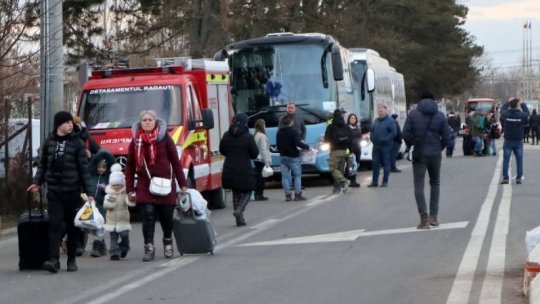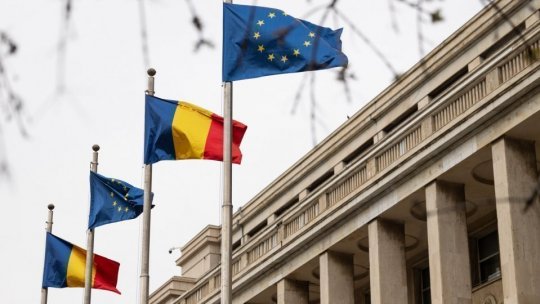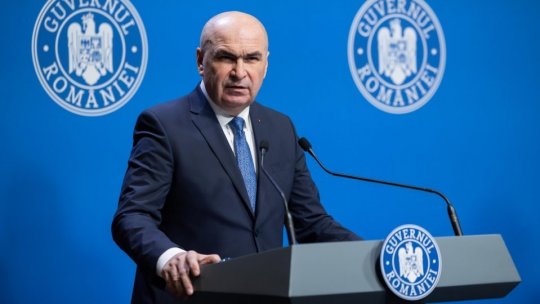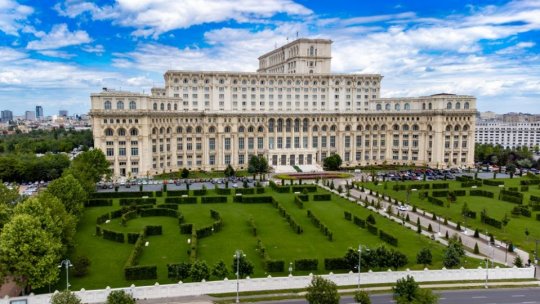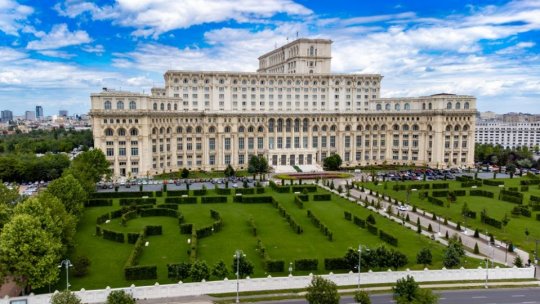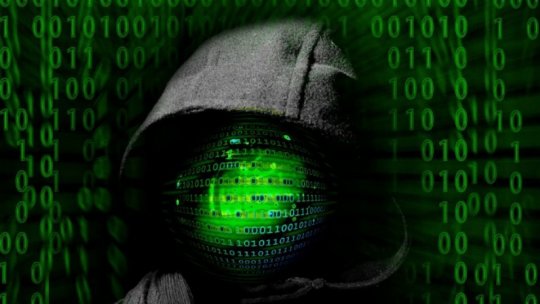Space forces and war in the 21st century
Military strategies of world’s great powers aim to neutralize the space technologies of the enemy.
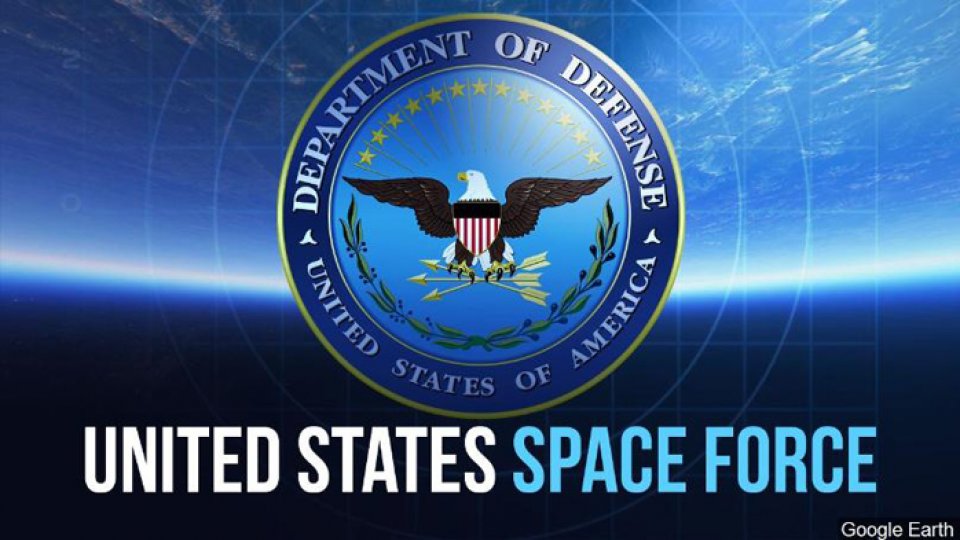
16 Septembrie 2019, 21:50
RADIO ROMANIA NEWS "Euroatlantica" Producer, Radu Dobriţoiu: Space operations require new developments in the 21st century for world powers that have global aspirations. Even if we talk about defensive missions or conflicts, technologies generate new types of operations. Military strategies of world’s great powers aim, among first measures, to neutralize the space technologies of the enemy. Very important, cosmic space does not fall under current military treaties. Russia continues to be actively involved in refurbishing cosmic devices for military purposes, satellites to help the army obtain the most accurate land mapping information and data. Russian Federation reestablished its aerospace forces four years ago. This week, Washington has officially established the US Space Command at Peterson Air Force Base in Colorado Springs. John William "Jay" Raymond, General in the United States Air Force, has been appointed as Commander of United States Space Command. Mission of the US Space Command is to discourage aggression and conflict, to defend the freedom of action of the United States and allies, to provide space combat power. China, in turn, supports its interest in space not only through satellites, but also through a robotic spacecraft that has been successfully sent to the far side of the Moon. Israel and India are also making efforts to develop technologies capable of acting in the nearby cosmos. France has set up a military space command this month, the European Commission will create a new Directorate General for Defense Industry and Space to support financing, development and deployment of armed forces. Special Guest of the edition is Lieutenant General (res) Alexandru Grumaz, former Consul General of Romania in Shanghai.Press correspondences from Washington and Moscow, also telephone intervention of Colonel (res) Florin Jipa, former spokesman of Romanian Ministry of Defense. Theme of current edition of "Euroatlantica" (Radio Romania News): "Space forces and war in the 21st century".
Radu Dobriţoiu: General Grumaz, US President Lyndon Johnson (1963-1969 n.a.) was declaring: "Control of space means control of the world" ... The United States military activity in outer space dates from the beginning of the space age, after the end of World War II, more precisely after the Soviet Union launched the first artificial satellite, "Sputnik", in 1957. Recent years have proven that space is truly the final frontier. How important are space forces and how do they act in the nearby cosmos?
Gen.Alexandru Grumaz: Let's take it from the word Sputnik that you said. Joseph Dunford, US Marine Corps General and Chairman of the Joint Chiefs of Staff, said a while ago: The US has reached a Sputnik moment again, when the military must act to maintain the nation's competitive advantage in space against opponents such as Russia and China. To a lesser extent, General Dunford recalled North Korea and Iran. (…) Here we have to say that US Space Command existed between 1985 and 2002, when it was abolished immediately after 9/11. This Space Command was set up by Reagan in that furious Star Wars campaign that made Russia to once again come to the negotiating table. The system crashed because of ...
Radu Dobriţoiu: The Soviet system ...
Gen.Alexandru Grumaz: The Soviet system crashed ...due to the fact that it did not ...
Radu Dobriţoiu: face the competition ...
Gen.Alexandru Grumaz: It did not face the competition ...
Radu Dobriţoiu: There are two competitions, the armaments race and the space race ...
Gen.Alexandru Grumaz: Exactly. So General Dunford compared this moment, plus President Donald Trump's call to action, with President John Kennedy's call after the Soviet Union started the space race with the Sputnik in 1957 and with its first space travel with an astronaut on board, in 1961. You said it very well, the Command is intended to deter potential enemies, and I would like to remind that, as you also said, Russia is working, at present, to develop systems of action against American satellites. . I am talking about low altitude satellites, those who are practically dealing with military and weather issues at the same time. You know very well that the Russians are working on the S 500 system that can attack satellites in ...
Radu Dobriţoiu: Targets from the Cosmos ...
Radu Dobriţoiu: As I mentioned in the preamble to "Euroatlantica", this week, the United States Space Command, a military structure headed by Air Force General John "Jay" Raymond, has been officially established in Colorado. During the ceremony, Chairman of the Joint Chiefs of Staff, General Joseph Dunford, has compared the present moment with the Sputnik moment.
RRA Correspondent in Washington, Doina Saiciuc, for "Euroatlantica": When the space force will be formed, it will have to develop its own intelligence professionals. So far, however, the support of the intelligence community is extremely important - said General Shaw (Maj.Gen.John E.Shaw, USAF, Deputy Commander Air Force Space Command, n.a) last Thursday at a national intelligence and information summit. "The challenge the Air Force Command is now facing is how to make the move to space as a war zone" - said General Shaw, "which means" - he continued - "preparing for a conflict that could expand into space if anti-satellite weapons were deployed. In a scenario where orbiting satellites would become targets, in the course of a conflict, the question arises: will the United States forces have sufficient intelligence to prevent and counter the attacks? A report from the Summit "The Future of Space 2060 and Implications for U.S.Strategy" – with a quote by President Lyndon B.Johnson: "Control of space means control of the world" - mentions some key conclusions. Among them is the following: The United States must recognize that, by 2060, space will become a major driver of national, political, economic and military power for any of the nations that will do their best to exploit this potential. China is implementing a long-term commercial and military civilian strategy to explore and economically develop the cislunar domain, with the explicit aim of displacing the United States as the leading space power. On Tuesday, at a ceremony at Peterson Air Force Base in Colorado Springs, Chairman of US Joint Chiefs of Staff, Marine Corps General Joseph Dunford compared the current moment to the Sputnik moment, when the US Army must take action to maintain its competitive advantage in space, against opponents like Russia and China, and the new Head of US Space Command, General John "Jay" Raymond, said he wants to discourage a war in space, by building a lethal force that can win a cosmic battle and maintain space superiority of the United States.
*
Radu Dobriţoiu: Colonel (res) Florin Jipa, former spokesman of Romanian Ministry of Defense, in a telephone intervention. We are talking, at "Euroatlantica", together with General Alexandru Grumaz, about space forces. Colonel Jipa, in support of this topic, please tell us how important the satellites are for the current military operations?
Col.Florin Jipa: Satellites have become the most important means of deducing battle actions and I am not just referring to the weather forecast or the information they get with the help of satellites, but in the first line of action, in battle. Right now, if we take the United States alone, when we're talking about their Space Command, almost 80% of the missiles fired against the enemy are satellite-guided. Think about what would happen if the opposing force could hit the satellites or introduce viruses, then you simply can’t hit the enemy. And this is just the beginning. I think this area will develop very much in the future.
Radu Dobriţoiu: Which countries have the chances to develop functional space forces?
Col.Florin Jipa: Well, you've already talked about the three powers - the United States, Russia and China, which are somehow in the 1st category, for example in 2007, China had a satellite destroying test that was a success and since then, Beijing has developed this program a lot. There is also the second category, with countries both from Europe and elsewhere in the world, it's about France and you said earlier that they have also developed a space command. Then there’s the UK, Israel and even India. At the beginning of this year, India also had a test to destroy a satellite from the ground, which again was a success.
Radu Dobriţoiu: Colonel Florin Jipa, thank you for joining "Euroatlantica". General Grumaz, "the 1967 Outer Space Treaty calls on signatory states to use the outer space only for peaceful purposes and prohibits placing of nuclear weapons or other WMD (weapons of mass destruction) on orbit or other celestial bodies or any other placement in outer space". It is very difficult, General, to distinguish military satellites from civilian ones or ...
Gen.Alexandru Grumaz: (...) There are three levels that satellites orbit the Earth. The first level is the group of Low-Earth orbit Satellites/LEO (with orbital altitudes varying from 180 to 2,000 km from Earth). This is where the military and weather satellites are. Next level is the group of the Medium Earth-orbit Satellites/MEO (with orbital altitudes varying from 2,000 to 36,000 km from Earth, orbiting with an approximate speed of 14,000 km per hour) which are used for GPS (Global Position System), data and voice. The third group is made of Geostationary Equatorial Orbiting satellites/GEO (located above the Equator, at an orbital altitude of 35,000 km). They rotate in the same direction at the same speed as Earth and are used for communications, weather monitoring and military.
Radu Dobriţoiu: Geostationary satellites.
Gen.Alexandru Grumaz: Exactly. A geostationary satellite can cover 34-42% of Earth's surface.
Radu Dobriţoiu: Extremely important. General, space forces, when we say this, can lead to an image of sophisticated spacecraft fleets or cross-fire with lasers, beams, explosions of very large proportions. For the time being, however, the military and researchers are actually focusing on space security, in the sense of keeping other powers away from satellites, as America actually wants.
Gen.Alexandru Grumaz: Before discussing this topic and creating the US Space Command, America made up a study at the Center for Naval Analysis (CAN), a government-paid study that explained the efficiency of such a new command (…), because for the moment there is only the command.
Radu Dobriţoiu: At the beginning of the year, the US has searched to form a new force category, the sixth category in the General Staff of the United States, but in the end there has only been formed a new Command, the 11th one.
Gen.Alexandru Grumaz: Yes, because this study was required by the Congress. Approval for the establishment of a new force category is given by the US Congress; so for this establishment of the space force as a separate military department ...
Radu Dobriţoiu: There is still a need for a Secretary of State who ...
Gen.Alexandru Grumaz: We do not discuss these issues, but starting from this study made by the Center for Naval Analysis one came to the conclusion that the space force would enroll 16,000 to 19,000 soldiers, which is not too much (…) Responsibilities were also analyzed and there was a recommendation, for example, to transfer the activities of the National Reconnaissance Office (NRO). Well, here's a problem, because there is a need for coordination between the Office of the Secretary of Defense and the Office of the Director of National Intelligence, we are discussing sensitive information, we are not discussing ... Also, study recommended that consolidation of programs ran by the Missile Defense Agency (MDA) should not be done within the space forces, these programs should remain independent, as they are today. There are many things that were presented in this study. What is certain, for the time being, is that Congress is deliberating.
Radu Dobriţoiu: That is in reference to the United States, General. Let's look at Moscow too, because it's important what happens there. Russia regards space as a zone of military action. Considering that achieving superiority in this area will be a decisive factor for victory in the event of future conflicts, Moscow took the first steps in the development of space forces in 2015. Russia set up a new category of Armed forces alongside naval and air forces, it established aerospace forces with specific missions. For the first time, this new category of forces has proven effective in the Syrian war.
RRA Correspondent in Moscow, Alexandru Beleavschi, for "Euroatlantica": Militarization of the cosmic space began with the launch of the first intercontinental ballistic missile, the civilian space programs being actually derived from the military ones and having mostly a dual purpose. Along with military satellites, orbital stations, except possibly the international one, space shuttles, telecommunication satellites, weather, exploration and photographing the Earth's surface, global positioning and many other satellites have a dual purpose and without them modern warfare is unthinkable. Among first measures, the military strategies of the great world powers search to neutralize the enemy's orbital groups, in order to isolate the political and military leadership and to paralyze the military and civilian infrastructure, industrial activities, cyber- space and information space. The cosmic space is also one of the theaters of operations of the new hypersonic weapons which are currently under intense development by at least Russia and the United States. Also, the great powers do not hide the fact that they have orbiting anti-satellite weapons. The cosmic space is not subject of disarmament treaties, and modern technologies allow deployment in space of attack weapons, including anti-satellite, nuclear with laser and electromagnetic beams and of another type. This can radically change not only military tactics and strategy, but also the very nature of war. In 2015, Russia established - after several reorganizations - a new category of forces - the aerospace ones, out of which aviation, anti-aircraft, missile defense forces and space forces. The aerospace forces were especially prominent in the Syrian campaign, being considered the spearhead of the Russian military forces. Last week, President Vladimir Putin said that a possible deployment of weapons in space would be a very serious threat to humanity. Imagine, said Kremlin leader, that above each one of us and of them (allusion to the Americans), there will permanently be a possible nuclear weapon on a geostationary orbit. Duration of the flight to the target, Putin pointed out, will be very small, and the defense very difficult. At the same time, during negotiations in Geneva, Russia and China - supported by other countries - insist on signing an international agreement that prohibits placement of weapons in outer space. In reference to this, Russian Deputy Foreign Minister Sergei Ryabkov, Chief Negotiator in talks with the United States on nuclear disarmament treaties, recently warned that there is a risk of a nuclear war even without the parties involved having the intention to trigger it.
Radu Dobriţoiu: General Grumaz, we are talking about military activity in the extraterrestrial space. My colleague Saşa (Alexandru Beleavschi, n.a.) recalled from Moscow that Russia, as of 2015, already has a category of space forces. Looks like the US is a bit more ...
Gen.Alexandru Grumaz: To be honest, I am waiting for a doctrine from the Kremlin to see how it intends to resolve military affairs. The last Kremlin doctrine was in 2014. It seems that over the past two years, the Russian government has begun to be concerned about updating several strategic documents related to national security. As Nikolai Patrushev (Secretary of the Security Council of the Russian Federation, n.a.) also said, Russia will update its national security strategy next year. There are many points that need to be addressed in this doctrine, from reforms that the Russians started in 2008, to the threats, the way they perceive threats against Russia and so on. Things are changing very fast and in these conditions we should look a little at what we have learned in Syria, because we are talking about modern warfare. Apart from the fact that Americans are using that 'multi domain task force' in Europe for the first time in the Euro-Atlantic area, they have used in the Indo-Pacific area… a force of 300 and 500 soldiers ...
Radu Dobriţoiu: Combined.
Gen.Alexandru Grumaz: Combined, because there’s currently activity on air, land, sea, cyber and space and then you must have ...
Radu Dobriţoiu: Including the Fifth, Sixth Fleets, they have their own satellites.
Gen.Alexandru Grumaz: So you have to have operations in several areas and you have to have a force prepared for that. You cannot have brigade level at present, but a force of 300-500 people is perfectly valid. I was talking about Syria. It is very important, because as an example of how a future war would unfold, we have it there - the hybrid forces used by Russia in Syria, launching strikes with the aim of reducing the economic potential, conducting psychological and disinformation actions, increasing mobility and maneuverability, efficient use of urban guerrilla combat tactics - and there is urban guerrilla in Syria - involvement in mobility actions with light vehicles and of course cyberattacks. So there would be something combined. Because of this...
Radu Dobriţoiu: Which does not work without these devices..
Gen.Alexandru Grumaz: You know, here, Saber Guardian used such a ...
Radu Dobriţoiu: Let's say it, Saber Guardian of this year was a large scale exercise. And shortly before this exercise there was a NATO drill, also in Romania, using these principles of IT science and war in the virtual space.
Gen.Alexandru Grumaz: Yes, 'multi domain task force' system was also used in exercises that took place in the Baltics. So they were used in the south, in the north ...
Radu Dobriţoiu: In all these exercises, but also in all that means missile guidance, gathering information, intelligence, maps as accurately as possible, discovering position locations, in all these areas, surely, the extraterrestrial space and the presence there, via satellites or by high-altitude drones, this is what the future might look and this is what is essential.
Gen.Alexandru Grumaz: It is clear and I want to tell you that Romania had the opportunity in 1996 to be the first country in Eastern Europe where a senior US official presented the use of 'No pilot' systems.
Radu Dobriţoiu: And we were also like a spearhead - just a reminder, General - in Iraq, where we had a special detachment with 'No pilot' aircraft ...
Gen.Alexandru Grumaz: ..the ones we discussed in '96, followed by the purchase of the Shadows ...
Radu Dobriţoiu: The three aircraft that were in Iraq.
Gen.Alexandru Grumaz: Yes, exactly. This is what I am telling you..there was the US Under Secretary of State for Procurement and Technology, Dr. Paul G.Kaminski, and other 20 generals in the room who listened to the lecture on the new weapon systems. In 1996.
Radu Dobriţoiu: General Grumaz, how much is propaganda and how much truth is there in the information about the Russian space technique?
Gen.Alexandru Grumaz: If it were all true, the Russians would have already arrived on Mars or on the Moon by now. The only area in which they excel is the construction of those missiles carrying the space capsules. And these are done with the financial support of the United States, to be very clear. So they are done with the support of the United States.
Radu Dobriţoiu: In a new competition, but this time not only with the United States, but with China, India, Israel, Great Britain, France, do you think the Russians will face economically?
Gen.Alexandru Grumaz: No, from an economic point of view it will be very difficult, because if I only take their last attempt to launch the nuclear-powered missile, a missile that ...
Radu Dobriţoiu: Accident, you mean.
Gen.Alexandru Grumaz: Accident. The accident means that you are not technologically prepared for this. I mean, you can't try to own a weapon for which, technologically, you're not ready.
Radu Dobriţoiu: Because we are talking about presence in the extraterrestrial space, which is very important, and there you have to own the newest and most functional technologies. "Euroatlantica" at the end. Topic of the edition: "Space forces and war in the 21st century". Special Guest in the studio was Lieutenant General (res) Alexandru Grumaz, former Consul General of Romania in Shanghai. Telephone intervention - Colonel (res) Florin Jipa, former spokesman of Romanian Ministry of National Defense. I am Radu Dobriţoiu, Producer of "Euroatlantica" and, together with Producer Nicu Popescu, I thank you for listening to Radio Romania News.
Source:RRA.Translated by Miruna Matei



